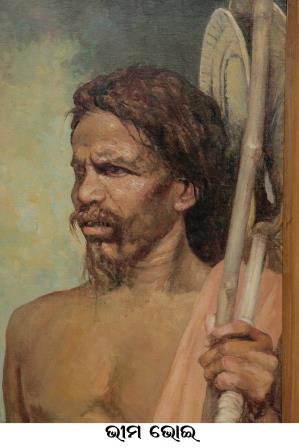Santhakabi Bhima Bhoi
Died :- 1895
Place of Birth :- Subarnapur

Legends have it that BhimaBhoi, a unique genius and spiritual poet, was born in the nineteenth century. Popularly known as Santha Kavi, or the saint poet, he had already become a legend by the first decade of the twentieth century when literary experts started discussing his life and achievements. The legend about him is so complex and mysterious that it is still not possible to say anything about him with certainty. As a result, the poet's date of birth, birthplace, field of worship, and life — everything is shrouded in controversy. The legend about his birth is as follows: He was probably born in the 1850s, on a full moon day of Baisakh. After birth, his mother left him by a pool. So in the language of the common man he was an illegitimate child but a ‘Divine Gift’ in the words of devotees. Janardan (Jana Bhoi) and his wife Maharagi, a Kandha couple, rescued and raised him as their own child.
BhimaBhoi was employed as cow tender in the house of Chaitanya Pradhan of Kakanpada. One day, while following the cows, he fell into an abandoned well near Kandara village. He called for help and people arrived. But he refused to take help of anybody other than the one who had thrown him into the well. Eventually Mahima Gosain appeared at the site and served a condition that he would pick him up if he agreed to propagate his thoughts. Not only that, he also blessed him with the power to write poetry.
It is also said that BhimaBhoi was not born blind. He did not declare himself blind in his writings. Some researchers speculate that he was not born blind but he lost his eyesight at an early age. They claim it was not possible for a blind child to tend cows in the forest. After receiving blessings from Mahima Gosain, he started his journey from village to village in 1866 spreading his words and ideals.
BhimaBhoi's personal life is also shrouded in controversy. It is said that learning from some source about the arrival of Mahima Gosain, young BhimBhoi, met him either at Malbiharpur or at Khuntuni. He returned after initiation. His poetry became the medium of propagating the words and thoughts of Mahima Gosain. His songs were devoutly sung by house-holder and monk devotees. The result was– his poetry filled the cultural void in many areas— from Banki, Aathagad, Dhenkanal to Balangir, Sambalpur, Sonepur, Boudh, Redhakhol and other parts of princely states as also in Jajpur.
It is learned that his organisational ability faced a challenge from the arrogant King Gaurachandra of Redhakhol. The king imprisoned him and ordered his exile from his state at the instigation of Brahmins and Kshatriyas. BhimaBhoi left Redhakhol and established an ashram in Khaliapalli of Sonepur state around 1877. The Raja and the Gauntia of Sonepur, two well-to-do individuals Hari Panda and Basu Panda, and other devotees helped him. The ashram had about 40 acres of land.
Legend says BhimaBhoi had acquired feudal status in a few years. He had horses which he rode; he moved from village to village in a palanquin studded with ivory. He also had a stock of arms and ammunition for his security. He had several wives. One of them, Sumedha, had a daughter and son born in 1892.
Every morning, devotees seated BhimaBhoi and Annapurna, his closest wife, on a couch, washed their feet with Panchamrit, and worshiped them. This royal lifestyle of a ‘lower caste seeker’ irked Niladhar Singhdeo, the king of Sonepur, who ordered him to enter into burning fire in order to test his piousness. Surprisingly, the king died of a pest-bite fever the night before the test. People realised that the king’s death was a result of divine ire. The locals utilised his songs as mantra to cure snake bites and exorcise demonic forces. In other words, a poet was able to fill the cultural, political and religious vacuums of the oppressed, act as their representative and their liberator in a vast region of Odisha.
His books include: ‘Halia Geeta’, ‘Dalkhai’, ‘Rasarkeli’, ‘Jaifula’, ‘Brahma Nirupana Gita’, ‘Adi-Anta Gita’, ‘Ashtak Bihari Gita’, ‘Shrutinisedha Gita’, ‘Nirveda Sadhana’, ‘Manusabhamandal’, ’Gharadharma’, ‘Mahimabinod’, hundreds of hymns, jananas, chautisha and ‘stutichintamani’ etc.
BhimaBhoi is immortalised in his ever quoted line, "Let my life continue to be in hell but the world attain liberation".
Books
Poems
Copyright © 2024 Odia Virtual Academy. All rights reserved Total Visitors- 1
Powered by: Odia Virtual Academy

